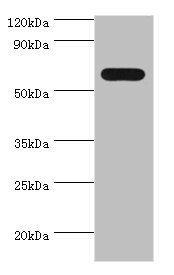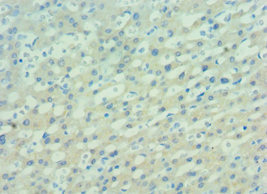Full Product Name
Rabbit anti-Homo sapiens (Human) PAX7 Polyclonal antibody
Alternative Names
FLJ37460 antibody; HUP1 antibody; OTTHUMP00000002534 antibody; Paired box 7 antibody; Paired box gene 7 antibody; Paired box homeotic gene 7 antibody; Paired box protein Pax-7 antibody; Paired domain gene 7 antibody; Paired domain gene HuP1 antibody; Pax7 antibody; PAX7 transcriptional factor antibody; PAX7/FKHR fusion gene, included antibody; PAX7_HUMAN antibody; PAX7B antibody; RGD1564360 antibody; RMS2 antibody
Immunogen
Recombinant Human Paired box protein Pax-7 protein (291-520AA)
Immunogen Species
Homo sapiens (Human)
Purification Method
Antigen Affinity Purified
Concentration
It differs from different batches. Please contact us to confirm it.
Buffer
PBS with 0.02% sodium azide, 50% glycerol, pH7.3.
Tested Applications
ELISA, WB, IHC
Recommended Dilution
| Application |
Recommended Dilution |
| WB |
1:200-1:1000 |
| IHC |
1:20-1:200 |
Storage
Upon receipt, store at -20°C or -80°C. Avoid repeated freeze.
Lead Time
Basically, we can dispatch the products out in 1-3 working days after receiving your orders. Delivery time maybe differs from different purchasing way or location, please kindly consult your local distributors for specific delivery time.
Usage
For Research Use Only. Not for use in diagnostic or therapeutic procedures.







